The NCAA has approved groundbreaking rules that will permit colleges to compensate their athletes, marking a significant shift from long-standing traditions within collegiate sports. These changes, which result from a major lawsuit settlement, are anticipated to take effect this summer, transforming the landscape of college athletics.
The series of nine proposals ratified by the NCAA board were anticipated, yet their enactment signals a pivotal moment in sports history. The upcoming adjustments will allow student-athletes to receive direct payments from their universities, a practice historically prohibited.
For these NCAA rules to become operational, they must receive final approval from a federal judge. A recent hearing raised the possibility of adjustments before the new regulations are implemented on July 1.
The revised rules will remove approximately 150 existing regulations and amend numerous others within the NCAA’s extensive rulebook. Notable measures include:
- Amending bylaws to enable schools to provide direct payments to athletes.
- Removing scholarship caps for teams while establishing roster limits intended to replace these caps. The specifics of these roster limits remain under discussion following an April hearing.
- Introducing annual reporting requirements for institutions that compensate athletes, with a projected payment pool of around $20.5 million for the largest universities starting the next academic year.
- Creating a clearinghouse for name, image, and likeness (NIL) agreements valued at $600 or more from third parties.
- Empowering a new enforcement body, formed by the conferences involved in the lawsuit, to ensure compliance with the fresh regulations. This includes adherence to roster limits, direct payment benefits to players, and third-party deal requirements.
A novel provision allows for the development of technological platforms for schools to track athlete payments and for athletes to report their NIL agreements. Additionally, athletes must be enrolled full-time and meet degree progress requirements to qualify for these benefits.
The board also received updates from a dedicated working group tasked with proposing methods to streamline NCAA governance. This topic has surfaced as larger conferences seek increased decision-making authority in certain domains.








